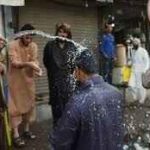CAIRO: As the Palestinian organization attempted to demonstrate its military might in spite of Israel’s Gaza offensive, Hamas claimed to have launched a “large rocket barrage” at Tel Aviv on Sunday, causing sirens to sound in the Israeli metropolis for the first time in four months.
Conversely, while Israeli tanks were prowling the outskirts of Rafah, near the primary entry point into Egypt from the south, at least five Palestinians were killed by strikes.
Eight rockets, according to the Israeli military, were seen to be crossing from the Rafah area, which is located about 100 kilometers south of Tel Aviv. Despite an order to cease the onslaught immediately from the top UN court, Israel continued its operations in this area.
Israel’s offensive has killed about 36,000 Palestinians, the most of them women and children, according to Gaza’s health ministry.
36,000 Palestinians have died, and Tel Aviv has signaled a new attempt at a truce.
In the most recent fighting, a house in Rafah’s eastern Khirbet al-Adas neighborhood was the target of an attack, according to Gaza’s civil defense agency, which reported that it had recovered six bodies. Witnesses claimed that Israeli artillery had also struck the Yibna camp in the city’s center, Rafah, and that Sooq al-Halal and Qishta districts had been heavily shelled.
Witnesses reported that intense artillery bombardment struck northern Gaza as Israeli airstrikes targeted the Nuseirat refugee camp elsewhere in Gaza. According to an AFP correspondent, Israeli tanks in Gaza City opened fire on locations near Zeitun and Netzarim. In the Jabaliya neighborhood of northern Gaza, fighting also persisted.
Although Israel says it intends to free Israeli captives it claims are being kept in the area and eliminate Hamas combatants holed up in Rafah, its offensive has made things worse for civilians and sparked an international uproar.
Truce initiatives
After conversations between US and Israeli intelligence officials and the prime minister of Qatar, there were some indications of progress toward reaching an agreement to end hostilities and return more than 100 Israeli prisoners detained by Hamas in Gaza.
According to a person with knowledge of the situation, it was decided to pick up the negotiations this week with “active US involvement” and new suggestions from the mediators in Qatar and Egypt. A Hamas spokesperson refuted the statement, saying it was untrue. Senior Hamas official living in exile, Izzat El-Reshiq, stated that contrary to what the Israeli media had claimed, the group had not heard from the mediators regarding any new dates for the start of negotiations. “Ending the aggression completely and permanently, in all of Gaza Strip, not only Rafah” is one of the demands he emphasized.
Although Prime Minister Benjamin Netanyahu has stated that the battle would not end until Hamas is destroyed, Israel is requesting the release of Israeli captives.
Relief vehicles pull into Gaza
After more than seven months of fighting that has left the enclave in a state of extreme damage and starvation, pleas have been made for Israel to send additional supplies into Gaza.
On Sunday, Israel got ready to let about 200 relief trucks enter Gaza via Kerem Shalom, which is located at the southeast corner of the Palestinian territory. This would avoid using the major Rafah crossing, which has been closed for several weeks.
It comes after a deal to temporarily transfer aid over the crossing was reached on Friday between Egyptian President Abdel Fattah al-Sisi and US President Joe Biden.
According to Egyptian Red Crescent spokesman Khaled Zayed, 200 relief trucks—four of which carried fuel—were scheduled to cross the Kerem Shalom border on Sunday.
On social networking site X, Egypt’s state-affiliated Al Qahera News TV posted a video of relief trucks arriving in Kerem Shalom, which served as the primary commercial crossing point between Israel, Egypt, and Gaza prior to the conflict.
Since Israel took control of the Palestinian side of the crossing on May 6 as part of an intensified offensive in the area, the Rafah crossing has been closed for over three weeks.
Egypt has refused to open its portion of the Rafah gate because it is becoming more and more concerned about the possibility of a big influx of Palestinians entering its territory from Gaza.








